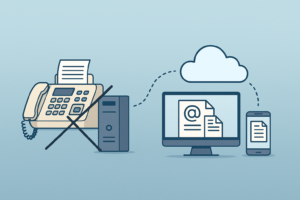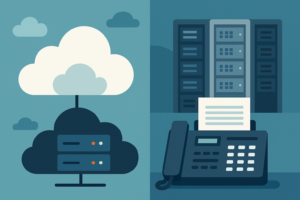Newer developments in sending a fax from the internet have allowed faxing through IP protocol to become an extremely viable solution for many sectors. Even though many people may think of faxing as an older, outdated technology, nothing could be further from the truth. FoIP is becoming increasing popular in many enterprises the world over, and is often seen as more useful than email.
Although document sharing via email certainly has its place in the world, FoIP is far from useless. So, to help you discover new uses for this amazing technology, we've put together this list of four industries that FoIP is absolutely perfect for:
1. Health Care
When discussing a list about industries that can benefit from FoIP, the health care sector has to be at the top. Modern medicine has been innovating in incredible leaps and bounds over the last few years; but one thing that hasn't changed is how health care professionals send documents. Quite a lot of doctors and nurses trade medical data over fax, and for good reason.
The Health Insurance Portability and Accountability Act is a U.S. law that, among other things, is meant to regulate the exchange of patient information. Medical documents contain a lot of sensitive data, ranging from embarrassing health problems to bank account numbers, and the rise of the Internet had (and has) people worried about whether or not doctors could keep this information secret when sending documents through digital means. The act, which was passed in 1996, states that documents containing patient information need to be sent securely "to ensure its confidentiality, integrity and availability and to prevent unauthorized or inappropriate access, use or disclosure."
For a long time, faxing was seen as the solution to meeting this compliance standard. However, as the world became more digital, faxing alone wasn't enough. FoIP provides the security of fax, with the convenience and speed of an email. Medical professionals can still keep their patients' information private, without having to waste their extremely precious time.
2. Public Relations
Public relations is a sector that thrives on efficiency. PR professionals need to get information like press releases out quickly, and just about everyone in the industry thinks this means utilizing email to their advantage. While email is certainly convenient when it comes to speed, what it doesn't do very well is stand out. According to a study by the Radicati Group, the average person sent and received around 125 emails every single day in 2015.
What's important to note here is that this report is following the average person. A journalist or simply someone within the media sector runs into even more emails than this, as communicating with and receiving quotes from sources are vital parts of their job. When you send a press release to one of these professionals via email, there's a solid chance that it'll simply be lost in the white noise of modern email culture.
"When someone receives a fax, they don't ignore it."
This doesn't happen with FoIP. When someone receives a fax, they don't ignore it. Fax machines make noise, and a physical piece of paper is a lot harder to glance over than a message in an email inbox. PR workers utilizing a cloud-based faxing system can make sure that their message gets out there and that it gets read.
3. Law
If there's one piece of free advice a lawyer will always give you, it's that you always need to get important discussions in writing. Whether it's discussing your lease with your landlord, or just asking for a promotion at work, having a conversation written down is immensely helpful if things turn sour and it's time to get litigious. Again, email works fine here, but it's not completely effective from a legal standpoint.
When you send an email that contains important information to someone, there's isn't a solid way to prove that that person ever read it. If this situation escalates and the time comes to pursue legal action, the recipient of the email could very well say they never saw it, even if they did.
This is where FoIP dominates email. First, as we've already discussed, no one ignores a fax. A physical document sitting in the fax machine demands to be read, and claiming you never saw it is extremely suspicious in a legal setting.
Not only that, but modern FoIP systems alert you when a message has been received, giving you exact times and dates that can be later used if and when a situation escalates to a courtroom setting. This makes FoIP a great way to seriously shorten the often lengthy process of taking someone to court.

4. Finance
Much like health care, the finance industry has some pretty strict compliance standards that must be adhered to. The Sarbanes-Oxley Act has similar document exchange requirements as HIPAA, since client information in the finance industry is just as sensitive as it is in the health care sector. However, the benefits of FoIP within finance go beyond simple security standards.
Sarbanes-Oxley also requires finance professionals to archive important documents that play a key role in their audits. This rule stipulates that such records must be kept for at least seven years. Although missives like email can be backed up with an outside managed service provider, doing so is costly and email doesn't always meet compliance standards. Again, this is where FoIP works better than email.
The FoIP system offered by FaxCore automatically archives documents sent through the system. These documents can be retrieved from anywhere at any time, and can be accessed through any browser. This means that workers in finance can simply send and receive documents via FoIP and never have to worry about archiving them to meet the compliance standards of Sarbanes-Oxley. The fact that FoIP also meets the security compliance standards of Sarbanes-Oxley is simply icing on the cake.
Enhance enterprise communication, collaboration and compliance efforts with a proven FoIP solution from FaxCore. Contact FaxCore today to learn more about their 'Partly-Cloudy' fax solutions.




